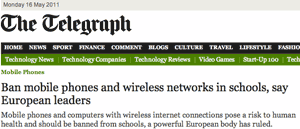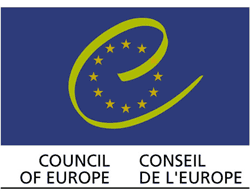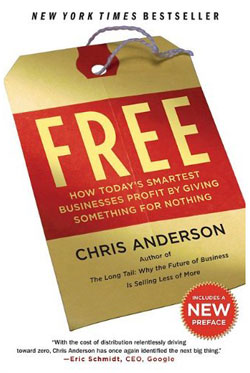Fear of a wireless planet
 Monday, May 16, 2011 at 6:34PM
Monday, May 16, 2011 at 6:34PM  Read all about it...In an age where there is so much information the headline is king.
Read all about it...In an age where there is so much information the headline is king.
So it is with those reader hungry newspapers who live off scare stories where they don’t have practice much, you know, “journalism”.
Journalism is defined in Wikipedia as “the practice of investigation and reporting of events, issues and trends to a broad audience”.
The Oxford English Dictionary is more succinct and describes it thus “the activity or profession of writing for newspapers or magazines or of broadcasting news on radio or television”
Whilst I prefer the more lofty definition presented by Wikipedia I’m more inclined to believe the investigation-free version offered by OED that's more in keeping with the journalistic practice demonstrated by todays mainstream press.
Take this headline from The Telegraph newspaper:
“Ban mobile phones and wireless networks in schools, say European leaders”
Or this headline from the Daily Express:
“CALL FOR SCHOOLS TO BAN MOBILES IN NEW CANCER ALERT”
Or this one from the Daily Mail:
“Ban mobile phones and wi-fi from schools ‘as they are potentially harmful’”
Heady stuff (no pun intended), more than enough to fuel numerous blogs (including this one) and copycat news items around the world much like the story of Chicken Little who after an incident with an acorn decided that the “sky was falling in” and sets off to tell the king collecting, other animals along the way.
Optional cartoon interlude:
Given the shortage of journalists working at these papers perhaps a little critical thinking from an enquiring mind might be in order.
So what’s the background to the story?
Well, a committee from the Council of Europe published a report / working document on May 6th entitled “The potential dangers of electromagnetic fields and their effect on the environment”. The committee proposes a draft resolution that
“all reasonable measures to reduce exposure to electromagnetic fields, especially to radio frequencies from mobile phones, and particularly the exposure to children and young people”.
It then proposes banning
“all mobile phones, DECT phones or WiFi or WLAN systems from classrooms and schools” and also anticipates legislation to “to keep high-voltage power lines and other electric installations at a safe distance from dwellings”.
It justifies this proposed action because “waiting for high levels of scientific and clinical proof can lead to very high health and economic costs”. So what’s the Council of Europe (CoE) and who belongs to the committee?
So what’s the Council of Europe (CoE) and who belongs to the committee?
First off, the CoE is not the European Union neither is it the European Parliament nor the European Council.
The CoE has been around for over 60 years with 47 member countries and whose objective is
“to create a common democratic and legal area throughout the whole of the continent, ensuring respect for its fundamental values: human rights, democracy and the rule of law.”
 Mr Jean Huss MP, Green Party, LuxembourgThe CoE’s Committee on the Environment, Agriculture and Local and Regional Affairs responsible for the report is composed of politicians rather than scientists. The report has been prepared by Mr Jean Huss, a Green Party MP in the Luxembourg legislative Chamber.
Mr Jean Huss MP, Green Party, LuxembourgThe CoE’s Committee on the Environment, Agriculture and Local and Regional Affairs responsible for the report is composed of politicians rather than scientists. The report has been prepared by Mr Jean Huss, a Green Party MP in the Luxembourg legislative Chamber.
The report has yet to be debated by Council of Europe which is scheduled for debate in Kiev on May 27th where it will be approved or otherwise. So currently this report does not represent the views of the Council of Europe. Besides even if it did the views expressed are somewhat different from the European Commission.
The reason why our auspicious newspapers would pick up on this non-story and run such misleading headlines is clear, they sell newspapers.
The reason why these politicians would ignore the peer-reviewed research from the World Health Organisation, Health Protection Agency and numerous other organisations including the European Commission in favour of claims made by the anti-RF lobby is less clear. Hello, may I speak with Mr Huss...It’ll be interesting to learn how the Council of Europe responds to this report.
Hello, may I speak with Mr Huss...It’ll be interesting to learn how the Council of Europe responds to this report.
Certainly if it makes recommendations about mobiles, Wi-Fi, WLAN, health and kids that differ from the advice already provided by the agencies responsible there’s a story worth reporting which may or may not have anything to do with health but until then let’s look at the facts rather than the catchy headlines.
If you've found this post interesting and would like to leave a comment please do!








